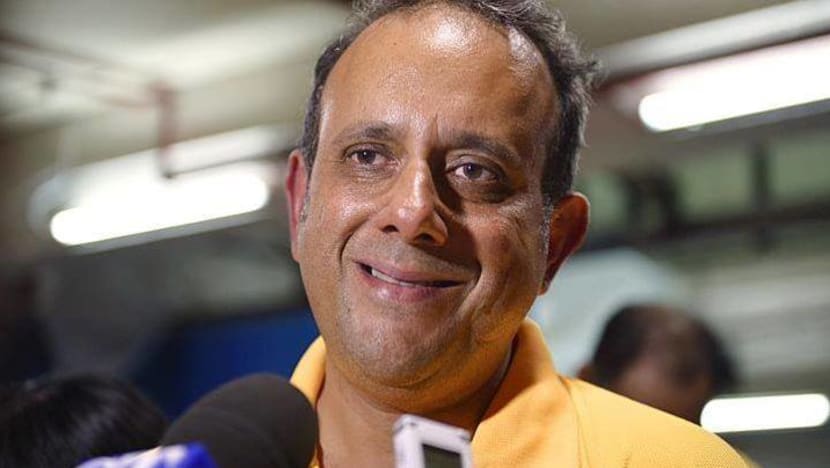Kenneth Jeyaretnam issued seventh POFMA order over comment on High Court judges' bonuses

Reform Party leader Kenneth Jeyaretnam. (Photo: Facebook/Kenneth Jeyaretnam)

This audio is generated by an AI tool.
SINGAPORE: Reform Party leader Kenneth Jeyaretnam was issued a correction direction under the Protection from Online Falsehoods and Manipulation Act (POFMA) on Wednesday (May 29) after he alleged that the Prime Minister and Law Minister can influence the sizes of performance bonuses paid to specific High Court judges.
Second Minister for Law Edwin Tong, who is also Minister for Culture, Community and Youth, instructed the POFMA Office to issue the order to Mr Jeyaretnam, the Ministry of Law said in a media release.
This is the seventh POFMA order that Mr Jeyaretnam has received, with the preceding six linked to his comments about the rental of black-and-white bungalows at Ridout Road by two ministers.
The latest order is tied to the defamation claims filed by the two ministers – Law and Home Affairs Minister K Shanmugam and Foreign Affairs Minister Vivian Balakrishnan – against Mr Lee Hsien Yang over comments he made about their rental of the state properties.
Last week a High Court judge ordered Mr Lee, the brother of former Prime Minister Lee Hsien Loong, to pay S$200,000 (US$ 148,000) in damages to Mr Shanmugam and Dr Balakrishnan for defaming them.
In a Facebook post on May 25, Mr Jeyaretnam questioned the judge's decision to award damages to the ministers and alleged that Mr Shanmugam as Law Minister "may have some input, along with the Prime Minister, into the appointment and promotion of High Court judges and into the size of their performance bonuses".
An article on the government's fact-checking website Factually said that this is untrue.
"Under Article 98(6) of the Constitution, the legislature shall by law provide for the remuneration of the Supreme Court judges," the article said.
"The Judges' Remuneration Act 1994 sets out the framework for the salaries, allowances and privileges accorded to Supreme Court judges as a class. The annual pensionable salary of Supreme Court judges as a class is fixed by law."
The High Court is part of the Supreme Court.
"It is the Chief Justice who then determines the salary and bonuses to be paid to each Supreme Court judge, within the scope of the framework set out in law," the article continued.
"Neither the Prime Minister nor any minister can determine or influence the payments to be made to specific judges under this framework."
The article also highlighted that the Constitution prohibits the alteration of a Supreme Court judge's terms of office, including remuneration, to their disadvantage after their appointment.
"Mr Jeyaretnam's allegation is thus false," the article said.
Mr Jeyaretnam has added a correction notice to his Facebook post – as required by the POFMA order – stating that it contains a false statement of fact and directing readers to the government's clarifications on Factually.
"INACCURATE PICTURE"
The Factually article also provided clarifications on other claims made by Mr Jeyaretnam in his post that were "misleading" and gave "an inaccurate picture".
The first additional clarification related to judicial appointments.
Under the Singapore Constitution, Supreme Court Judges "are appointed by the President, acting in his discretion, if he concurs with the advice of the Prime Minister".
However, the Constitution "requires the Prime Minister to consult the Chief Justice before tendering his advice on the appointment of judges to the President".
"In putting forward names, a wide variety of people may be and often are consulted," the article said.
"Such persons will include lawyers in private practice, lawyers in government, as well as others who may have knowledge of the persons being considered for appointments."
Once appointed, judges can only be removed on grounds prescribed in the Constitution, and only on the recommendation of a tribunal or at least five people who hold or have held office as Supreme Court judges, or who hold or have held equivalent offices in the Commonwealth.
The Constitution also sets out the process for the appointment and promotion of officers of the Singapore Judicial Service, the article read. This process "is within the exclusive control of the Judicial Service Commission, which is headed by the Chief Justice".
"By omitting these critical facts about the judicial appointment process, Mr Jeyaretnam seeks to undermine public confidence in the judicial system and the many men and women of Singapore's Judiciary and the Singapore Judicial Service," the article said.
The second additional clarification related to Singapore's defamation laws
In his post, Mr Jeyaretnam slammed the laws, saying that they "only serve to protect those in positions of power".
"This is inaccurate," said the article.
"People should be entitled to protect themselves against false allegations against them which affect their reputations. In Singapore, the protection afforded by defamation law applies equally to everyone."
The article cited the career of opposition politician Chiam See Tong in refuting Mr Jeyaretnam's claim.
"Throughout his career, he rigorously scrutinised the government and those in power and has never been sued for defamation," it said.
"In fact, he has taken action against others, including two former government ministers, for defaming him. The ministers apologised and reached an out-of-court settlement with him."
In February this year, Mr Jeyaretnam's POFMA-related actions were escalated to the Attorney-General's Chambers, which said it would assess if any further action should be taken against him.
The article said that, in his May 25 post, he "(continued) to propagate false and unfounded statements, reflecting a deliberate intent to undermine (Singapore's) public institutions".















